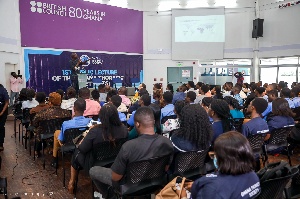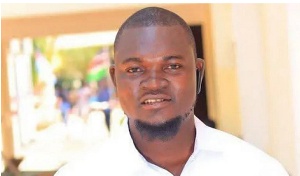- Home - News
- Elections 2024
- News Archive
- Crime & Punishment
- Politics
- Regional
- Editorial
- Health
- Ghanaians Abroad
- Tabloid
- Africa
- Religion
- Photo Archives
- Press Release
General News of Tuesday, 22 April 2025
Source: www.ghanawebbers.com
Ghana Thoracic Society declares war on air pollution at maiden public lecture
“Air pollution is killing us, and we can’t even see it.”
This was the message from experts at the Ghana Thoracic Society's first public lecture. The event took place on Wednesday, April 16. It aims to start a nationwide movement against what they call a "neglected killer."
The lecture occurred at the British Council Hall in Accra. The theme was “A Neglected Killer: Air Pollution and the Lung.” It gathered pulmonologists, public health researchers, clean air advocates, and environmental scientists. They all raised concerns about Ghana’s worsening air quality crisis.
Dr. Sandra Kwarteng Owusu shared alarming findings about children’s health. She noted a dangerous link between school commutes and respiratory issues. Many children experienced higher exposure levels while traveling to school.
One school had many children reporting asthma symptoms during the day. Desmond Appiah, Ghana’s Country Lead for Clean Air Fund, emphasized that air pollution is often invisible. He said it’s easy to ignore but leads to serious diseases like strokes and diabetes.
Appiah stated that air pollution causes at least 28,000 deaths in Ghana each year. He called for a clear national clean air policy to guide interventions effectively.
Professor Kofi Amegah spoke about everyday decisions impacting air quality. He urged transitioning to clean cooking solutions like LPG instead of charcoal. He also suggested taxing high-emitting vehicles or restricting their roadworthiness.
Amegah proposed policies for vehicle owners to replace old cars over time with financial support. Colonel Dr. Clement Titus Laryea echoed the need for coordinated action against air pollution.
Professor Jane Afriyie Mensah, President of the Ghana Thoracic Society, expressed urgency in addressing this issue. She mentioned that this was just their first public lecture but more initiatives are planned.
The society will focus on sectors most affected by air pollution through educational activities. As the lecture concluded, it felt like a rallying cry for change.
“We hope this will generate public support,” said Professor Mensah. With strong attendance at Wednesday's event, the movement to clean Ghana’s air has clearly begun.











